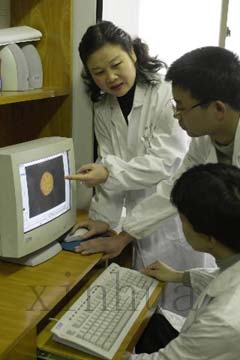Yijia Lou
2017-08-18 | 药学院英文网

- Name:Yijia Lou
- Title:Professor
- Tel:86-571-88208403
- Email:yijialou@zju.edu.cn
- Office:
Education
University student. Pharmacy,
Ph.D. Pharmacology & Toxicology, Shanghai Institute of Materia Medica, Chinese Academy of Sciences, Shanghai, PRC
Teaching
Pharmacology, Drug Toxicology
Research Interests
1. New targets research and related new drug development for current diseases threatening health (Cardio-Cerebral Vascular & Hepatic Pharmacology).
2. Embryonic stem cells directional differentiation and developmental biology.
3. Proteomics/ enzymes, signal transduction in pharmacology & toxicology
4. Molecular mechanism in Traditional Chinese Medicine Therapeutics.
Professional Experiences and Affiliations
1. Teaching Assistant, Lecturer, Associate Professor, Dept of Pharmacology,
2. 1998 �up to now:Professor, General Director, Institute of Pharmacology & Toxicology and Biochemical Pharmaceutics, College of Pharmaceutical Sciences, Zhejiang University.
3. Visiting Researcher (1988-1989), Faculty of Biology,
4. Visiting Researcher (1997-1998),
5. Senior Visiting Scientist (2002),
6. Senior Visiting Scientist (2003),
7. Senior Visiting Scientist (2006),
8. Senior Visiting Scientist (2006),
9. Member of ACTA PHARMACOLOGICA SINICA Review Committee.
10. Society of Toxicology, Society for Reproductive Science.
11. Society of Pharmacology, Society for Drug Toxicology.
Selected Publications (from more than 80)
1. Isorhamnetin prevent endothelial cell (EA.hy926) injuries from oxidized LDL via activation of p38MAPK European J Pharmacology 2006; 547:22-30
2. Further evidence that rat liver microsomal glutathione transferase 1 is not a cellular protein target for S-nitrosylantion. Chemico-Biological Interactions 2006; Epub ahead of print.
3. Flavonoids from Seabuckthorn protect endothelial cells (EA.hy926) from oxidized low-density lipoprotein induced injuries via regulation of LOX-1 and eNOS expression. J Cardiovasc Pharmacol 2006;48(1):834-841.
4. Prenylflavonoids as Non-Steroidal Phytoestrogen and Related Structure-activity Relationships. ChemMedChem 2006;1(4):482-488.
5. Icariin-mediated expression of cardiac genes and modulation of nitric oxide signaling pathway during differentiation of mouse embryonic stem cells into cardiomyocytes in vitro. Acta Pharmacologica Sinica 2006; 27(3):311-20.
6. Kinetic study of cytochrome P450
7. Kinetic study of CYP
8. Total flavones from Elsholtzia blanda reduce infarct size during acute myocardial ischemia by inhibiting myocardial apoptosis in rats. J Ethnopharmacology 2005; 101:169-175.
9. Icariin-madiated modulation of cell cycle and p53 during cardiomyocyte differentiation in embryonic stem cells. European J Pharmacology 2005; 514:99-110.
10. Total flavones from Elsholtzia blanda reduce infarct size and improve heart function during acute myocardial infarction by inhibiting myocardial apoptosis in canines Acta Cardiologica 2005; 60(3):295-301.
11. Estrogenic effects of two derivatives of icariin on human breast cancer MCF-7 cells Phytomedicine 2005 ;12:735-741.
12. Metabolism of malphalan by rat liver microsomal glutathione S-transferase. Chemico-Biological Interactions 2005;152:101-106.
13. Inducible effects of icariin, icaritin, and desmethylicaritin on directional differentiation of embryonic stem cells into cardiomyocytes in vitro Acta Pharmacologica Sinica 2005; 26(4):477-485.
14. Microsomal glutathione Transferase 1 is not S-nitrosylated in rat liver microsomes or in endotoxin challenged rats. Pharmacological Research 2005;51(4):303-310.
15. Determination of rat urinary metabolites of icariin in vivo and estrogenic activities of its metabolites on MCF-7 cells. Pharmazie 2005;60(2):120-125.
16. Proliferation-stimulating effects of icaritin anddesmethylicaritin in MCF-7 cells European J Pharmacology 2004; 504:147-153 (SCI);
17. Determination of icariin and metabolites in rat serum by capillary zone electrophoresis: rat pharmacokinetic studies after administration of icariin. J Pharmaceutical and Biomedical Analysis 2004; 36:365-370.
18. Metabolism of chlorambucil by rat liver microsomal glutathione S-transferase. Chemico-Biological Interactions 2004; 149:61-67.
19. Protective effect of total flavones from Elsholtzia blanda (TFEB) on myocardial ischemia induced by coronary occlusion in canines. J Ethnopharmacology 2004; 94(1);101-107.
20. Pathologic characteristics of immunologic injury in primary cultured rat hepatocytes and hepatoprotection of Glycyrrhizin from cytotoxicity in vitro. Acta Pharmacologica Sinica 2003;24(8):771-777.
21. Relationship between activation of microsomal glutathione S-transferase and metabolism behavior of chlorambucil. Pharmacological Research 2003;48:623-630.
22. Microsome glutathione S-transferase and drug metabolism. Asian J Drug Metabolism and Pharmacokinetics 2003;3(3):184-189.
Editor in chief:
1.《Drug Toxicology》 A national planning teaching textbook for medical and pharmaceutical students in university, Published by People’s Hygiene Publishing Company, 2003 (1st), 2007 (2nd).
2. 《Non-clinical evaluation for new drug development》A key teaching textbook for medical and pharmaceutical students in university, Published by Zhejiang Science and Technique Publishing Company, 2004.
Professor
-
18
2017.08
-
18
2017.08
-
18
2017.08
-
18
2017.08
-
18
2017.08
-
18
2017.08
